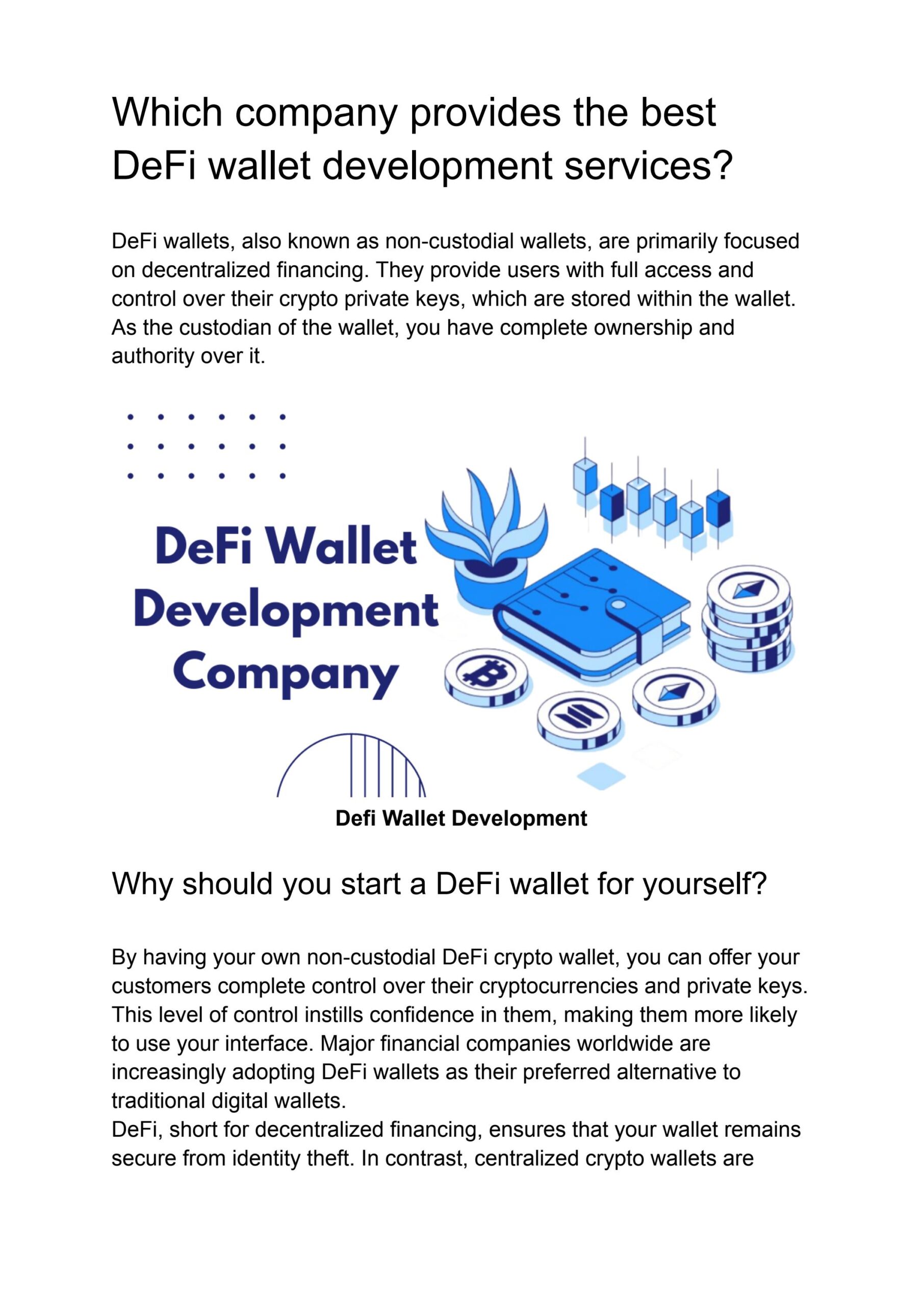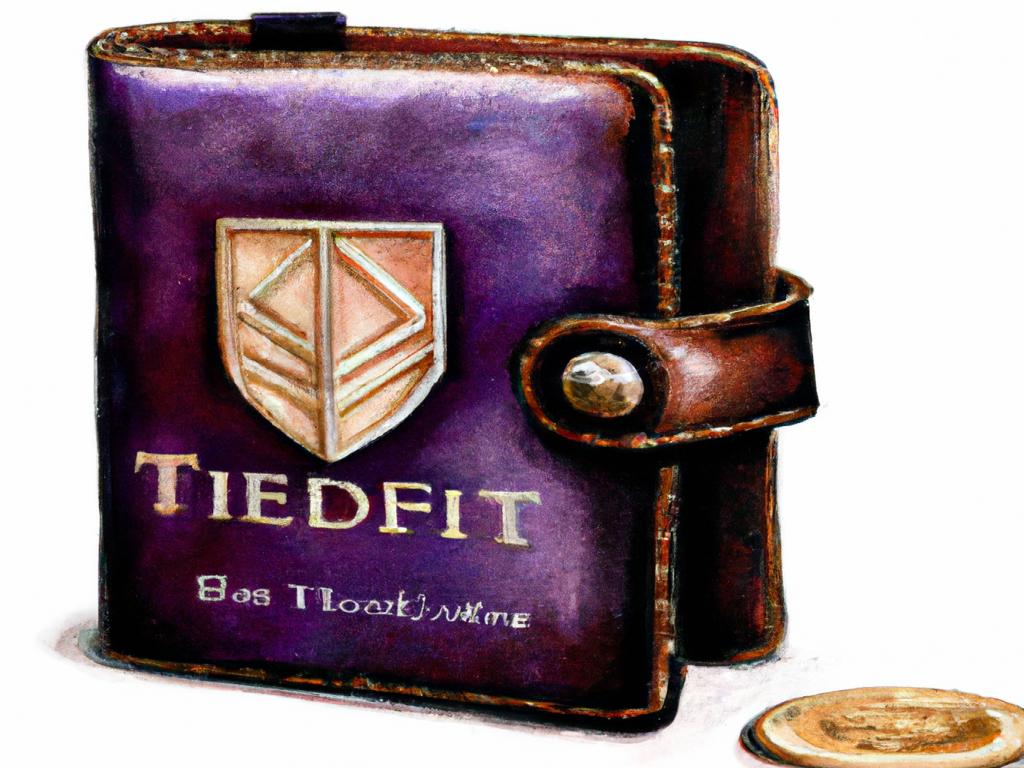A crypto DeFi wallet development company offers users top solutions for secure digital asset management. With the rise of cryptocurrencies and the DeFi (Decentralized Finance) movement, the need for secure and convenient wallets to store and manage digital assets has become essential.
When it comes to wallets, there are various types available, such as web wallets, mobile wallets, hardware wallets, and conventional wallets. Each type of wallet has its own advantages and disadvantages. For example, web wallets are easily accessible from any device with an internet connection, but they can be vulnerable to hacking. Mobile wallets, on the other hand, provide convenience for users on the go, but they may lack the advanced security features of hardware wallets.
One of the key differences between traditional wallets and DeFi wallets is the way they handle private keys. Traditional wallets usually store the user’s private keys on a centralized server, which can be risky as the custodian of the wallet can access and control the user’s funds. DeFi wallets, on the other hand, are built on blockchain technology and allow users to have full control over their private keys. This means that users have complete ownership and control over their digital assets, without the need for a custodian.
With the help of a crypto DeFi wallet development company, users can have access to various services and features to meet their specific needs. These services may include multi-currency support, staking, lending, borrowing, and more. The development company can guide users in choosing the right wallet for their needs and provide them with the necessary tools to securely manage their digital assets.
Whether you are a seasoned crypto investor or a newbie in the world of digital finance, a DeFi wallet can be a game-changer. The difference it makes in terms of security and control over your digital assets is significant. With the availability of mobile and web-based wallets, managing your cryptocurrencies becomes easier and more convenient than ever before. So, if you haven’t already, consider exploring the options offered by a crypto DeFi wallet development company today!
DeFi Wallet
A DeFi wallet is a type of digital wallet that is specifically designed to store and manage decentralized finance (DeFi) assets. Unlike conventional wallets, DeFi wallets give users full control over their funds and allow them to interact with various DeFi protocols.
One of the key differences between traditional wallets and DeFi wallets is the type of keys they use. Traditional wallets typically use a custodian or a centralized service to hold the private keys for their users. In contrast, DeFi wallets use non-custodial solutions, where users have full control over their private keys.
DeFi wallets are available in various forms, including mobile, web, and hardware wallets. Mobile wallets are the most common type of DeFi wallet, as they offer convenience and accessibility for users on the go. Web wallets, on the other hand, are accessed through a web browser and provide a convenient solution for users who prefer to manage their DeFi assets on their desktop.
Hardware wallets, such as Trezor or Ledger, are another popular option for DeFi users who prioritize security. These wallets store the user’s private keys offline, providing an extra layer of protection against hacking and malware attacks. They often require a physical device to be connected to the user’s computer or smartphone in order to access funds.
DeFi wallets support a wide range of cryptocurrencies and tokens, including both traditional cryptocurrencies like Bitcoin and Ethereum, as well as newer DeFi tokens. They can help newbies navigate the complex world of DeFi by providing tools and resources to guide them in their financial journey.
In summary, a DeFi wallet is a specialized type of digital wallet that allows users to securely manage their decentralized finance assets. With a non-custodial approach and support for various cryptocurrencies, DeFi wallets provide users with full control over their funds and the ability to participate in the exciting world of DeFi.
Difference between Traditional Crypto wallets vs DeFi Wallet

When it comes to managing cryptocurrencies, there are two main types of wallets available: traditional crypto wallets and DeFi wallets. While they both serve the purpose of storing digital assets, there are some key differences between the two.
Traditional Crypto Wallets:
- Traditional crypto wallets are the more common type of wallet and are often used by newbies to the cryptocurrency world. They can be in the form of a web, mobile, or hardware wallet.
- These wallets require users to manage their own private keys and are often seen as a more secure option. However, this also means that if you lose your private keys, your cryptocurrencies will be lost forever.
- Traditional crypto wallets are usually custodian wallets, meaning they rely on a centralized third party for the storage and security of your digital assets.
DeFi Wallets:
- DeFi wallets, or decentralized finance wallets, are specifically designed for the DeFi ecosystem and the management of decentralized tokens and assets.
- Unlike traditional wallets, DeFi wallets do not rely on a custodian and give users full control over their funds. This means that users are responsible for their own security and must take precautions to protect their private keys.
- DeFi wallets are typically web-based and can be accessed through popular DeFi platforms. They are often integrated with different DeFi protocols, allowing users to easily interact with various decentralized applications and services.
In summary, the main difference between traditional crypto wallets and DeFi wallets lies in the level of control and responsibility users have over their digital assets. Traditional wallets offer a more user-friendly experience with custodian services, while DeFi wallets provide users with full control and direct access to the decentralized finance ecosystem.
Hardware Wallets
When it comes to digital asset management, there are various types of wallets available to users. While mobile and web wallets are more traditional and convenient, they cannot provide the same level of security as hardware wallets.
A hardware wallet is a physical device that is specifically designed to store your cryptocurrencies and private keys. Unlike traditional wallets, which are software-based and rely on the security of the device they are installed on, hardware wallets are standalone devices that are immune to many of the vulnerabilities associated with conventional wallets.
The main difference between hardware wallets and other types of wallets lies in their custodian model. With hardware wallets, the user is in complete control of their private keys, meaning they have full ownership and control over their assets. This is in contrast to web and mobile wallets, where the custodian (typically a central entity) holds the private keys on behalf of the user.
Hardware wallets are specifically made to ensure the security of your crypto assets and provide a high level of protection against potential threats such as hacking, phishing, and malware attacks. They use advanced encryption technologies and often require a physical button press or PIN code entry to authorize transactions.
For newbies in the world of crypto and DeFi, hardware wallets can be a great solution. They offer a user-friendly interface and guide users through the process of generating and storing their seed phrase, which is crucial for recovering their assets in case of loss or theft. This seed phrase is a unique sequence of words that acts as a backup to restore access to your wallet and tokens.
Overall, hardware wallets provide a secure and reliable solution for managing your crypto assets. With their offline storage and advanced security features, they are the preferred choice for users who prioritize the safety of their digital currencies and want to ensure that they are in full control of their funds.
Mobile wallets
Mobile wallets are a type of cryptocurrency wallet that allows users to manage their digital assets on a mobile device. These wallets are designed to provide a convenient way for users to access and control their cryptocurrencies on the go.
One of the main differences between mobile wallets and conventional wallets is that mobile wallets cannot store the user’s seed or private keys. Instead, they offer a user-friendly interface that provides access to the user’s digital assets stored elsewhere, such as on a web or hardware wallet.
For users who are new to crypto and need assistance, there are various mobile wallet development services available that can help guide them in managing their cryptocurrencies and tokens. These services provide a sense of security by ensuring that the user’s private keys are not stored on the mobile device.
Mobile wallets also play a crucial role in the growing decentralized finance (DeFi) space. They allow users to interact with DeFi protocols and access various DeFi services directly from their mobile devices. This has made DeFi more accessible to a wider range of users.
In contrast to traditional custodian services, mobile wallets provide users with a greater level of control over their digital assets. Users have complete ownership of their private keys and can transact without relying on a third party. This aligns with the principles of DeFi, which aims to decentralize finance and remove intermediaries.
Overall, mobile wallets have become an essential tool for crypto users, providing them with a convenient and secure way to manage their digital assets on the go. As the development of mobile wallet technology continues to evolve, we can expect to see new and innovative features that enhance the user experience and offer even greater security.
Traditional Crypto Wallet
A traditional crypto wallet is a type of digital wallet that allows users to store, send and receive various cryptocurrencies. Unlike centralized custodian wallets, traditional wallets provide users with full control over their private keys, making them responsible for the security of their assets.
For newbies in the crypto world, traditional wallets may require a certain level of technical understanding. They need to be familiar with concepts such as seed phrases, public and private keys, and the importance of securely storing this information. This is where a mobile wallet can help, as it provides a user-friendly interface and guides users through the setup and management process.
One key difference between traditional wallets and custodian wallets is the level of control and ownership. With traditional wallets, users have complete control over their private keys and can manage their assets independently. In contrast, custodian wallets hold the private keys on behalf of the user, which means the user relies on the custodian for asset management.
Traditional wallets are available in various forms, including software wallets, hardware wallets, and web wallets. Software wallets are mobile or desktop applications that users install on their devices. Hardware wallets are physical devices that store private keys offline, providing an additional layer of security. Web wallets are online platforms that allow users to access their wallets through a web browser.
Whether you choose a traditional wallet or a custodian wallet depends on your preferences and needs. If you value full control over your assets and prioritize security, a traditional wallet may be the right choice for you. However, if convenience and ease of use are more important, a custodian wallet might be a better fit.
Type of crypto DeFi Wallet development services
A crypto DeFi wallet is a digital wallet that allows users to securely store and manage their cryptocurrencies. There are different types of crypto DeFi wallet development services available, each catering to specific user needs and preferences.
1. Mobile Wallets
Mobile wallets are smartphone applications that provide users with the convenience of accessing their cryptocurrencies on the go. These wallets are user-friendly and offer features such as QR code scanning for easy transaction initiation. Mobile wallets can be secured with a PIN or biometric authentication, ensuring the safety of the user’s private keys.
2. Hardware Wallets
Hardware wallets are physical devices that securely store a user’s private keys offline. These wallets are considered one of the safest options for storing cryptocurrencies, as they provide an extra layer of protection against hacking attempts and malware. Hardware wallets are typically used for long-term storage of large amounts of cryptocurrencies and are built to withstand various security threats.
3. Web Wallets

Web wallets are online platforms that allow users to access their cryptocurrencies using a web browser. These wallets are convenient for users who need frequent access to their cryptocurrencies and prefer an easy-to-use interface. However, web wallets are more susceptible to hacking and phishing attacks compared to hardware wallets, as they rely on an internet connection and are stored in a centralized manner.
4. Conventional Wallets vs. DeFi Wallets
Conventional wallets are traditional wallets used in the world of finance, while DeFi wallets are specifically designed for decentralized finance (DeFi) applications. The main difference between the two is that DeFi wallets support the management of various tokens and cryptocurrencies, including those specific to the DeFi ecosystem. DeFi wallets also offer features such as staking, lending, and borrowing, which traditional wallets cannot provide.
5. Custodian Wallets
Custodian wallets are managed by third-party service providers who offer additional security measures and support for institutional investors and high-net-worth individuals. These wallets are designed to protect larger amounts of cryptocurrencies and may offer services such as multi-signature authentication and insurance coverage.
In summary, the type of crypto DeFi wallet development services available cater to the diverse needs of users in managing their cryptocurrencies. Whether it is through a mobile, hardware, or web wallet, users have options to ensure the security and accessibility of their digital assets.
Web wallets
A web wallet is a type of cryptocurrency wallet that is accessible through a web browser. Unlike traditional wallets, which are software applications that need to be installed on a device, web wallets are developed to be used directly on the web. They provide users with a convenient and user-friendly interface for managing their digital assets.
One of the key differences between web wallets and traditional wallets is the use of seed phrases. In traditional wallets, users are typically required to create a seed phrase, which serves as a backup in case they lose access to their wallet. Web wallets, on the other hand, often generate a unique seed phrase for each user, which is stored securely by the wallet’s custodian.
Web wallets support various cryptocurrencies, including both popular coins and tokens associated with DeFi (Decentralized Finance) platforms. This means that users can store, send, and receive different types of assets, all within the same wallet. Additionally, web wallets often provide additional services, such as staking, lending, and borrowing, which allow users to take advantage of the opportunities offered by the DeFi ecosystem.
Web wallets are particularly beneficial for newbies in the crypto space, as they provide a user-friendly interface and guide them through the process of managing their digital assets. Unlike traditional wallets, users do not need to download and install any software, making it accessible to those who may not be tech-savvy. Additionally, web wallets offer a higher level of security for private keys compared to mobile or hardware wallets, as they are typically stored securely on the server side.
While web wallets are a convenient and accessible option for managing digital assets, it’s important to note that they have their limitations. They are reliant on an internet connection, and users need to trust the custodian of the wallet with the security of their funds. For those who prioritize total control of their private keys and want to minimize the reliance on third parties, hardware wallets or mobile wallets may be a better choice.
In summary, web wallets are a type of digital wallet that can be accessed through a web browser. They provide users with a user-friendly interface, support various cryptocurrencies, and offer additional services in the DeFi space. While they may not offer the same level of control as hardware wallets, they are a convenient option for managing digital assets.
DeFi Wallet Development Guide For Newbies

DeFi, short for decentralized finance, is a growing trend in the crypto world. As a new user, it’s important to understand the different types of wallets available to manage your digital assets securely. One type of wallet commonly used is a private web wallet.
A private web wallet allows users to store their cryptocurrencies securely on the web. It offers the convenience of accessing your funds from any device with an internet connection. This type of wallet is different from hardware wallets or traditional custodian services, as it doesn’t require you to possess a physical device.
Web wallets are ideal for newbies who are just starting their journey in the crypto space. They provide an easy-to-use interface and are compatible with various cryptocurrencies and tokens. However, compared to hardware wallets, they are considered to be less secure as they are prone to hacking and phishing attempts.
If you’re concerned about the security of your crypto assets, a hardware wallet might be the better option. These wallets are physical devices specifically designed to store your digital currencies offline. They offer a higher level of security as they keep your private keys offline, reducing the risk of unauthorized access.
For newbies in the DeFi space, it’s important to understand the difference between conventional finance and decentralized finance. DeFi wallets allow users to interact with various DeFi protocols, enabling them to earn interest, lend, borrow, and trade crypto assets in a decentralized manner. This is a stark contrast to traditional custodian services, where users have to rely on intermediaries to manage their assets.
In conclusion, as a newbie in the crypto space and DeFi world, understanding the different types of wallets available and their pros and cons is crucial. Whether you choose a web wallet or a hardware wallet, it’s important to prioritize the security of your assets and choose a wallet that aligns with your needs.
Frequently asked questions:
What is a web wallet?
A web wallet is a type of cryptocurrency wallet that is accessed through a web browser. It allows users to securely store and manage their digital assets online.
What are the benefits of using a web wallet?
Some benefits of using a web wallet include easy accessibility, as it can be accessed from any device with an internet connection, and convenience, as users don’t need to download any software.
What is a traditional crypto wallet?
A traditional crypto wallet is a software program that stores private keys and interacts with different blockchain networks to allow users to send and receive digital assets.
What are the advantages of mobile wallets?
Mobile wallets provide the convenience of accessing your digital assets on the go, as they can be downloaded and used on mobile devices like smartphones and tablets.
What is the difference between traditional crypto wallets and DeFi wallets?
The main difference is that DeFi wallets are specifically designed to interact with decentralized finance protocols, allowing users to access features like lending, borrowing, and earning interest on their digital assets.
What are hardware wallets?
Hardware wallets are physical devices that store a user’s private keys offline. They provide a high level of security as the private keys never leave the device, protecting against potential online threats.
What are the advantages of using a DeFi wallet?
Using a DeFi wallet allows users to securely manage their digital assets while also taking advantage of the various decentralized finance protocols and services available in the market.
What types of crypto DeFi wallet development services are available?
There are various crypto DeFi wallet development services available, including custom wallet development, integration with existing DeFi protocols, security audits, and smart contract development.
Video:
Top 5 DeFi Crypto Wallet in 2023: How to Choose?
DEFI INFINITE MONEY TRICK. Crypto INSANE GAINS +300% ALL IN.
Tangem Wallet Full Review! (Watch First!) (2023) #1 Seedless Wallet! Walkthrough & Unboxing



I think it’s crucial to choose a reputable Crypto DeFi Wallet Development Company to ensure the security of our digital assets. The rise in cryptocurrencies and the DeFi movement has made it more important than ever to have a secure and reliable wallet. It’s interesting to learn about the different types of wallets available and their advantages and disadvantages. I personally prefer hardware wallets for their advanced security features, even though they might not be as convenient as web or mobile wallets.
As an investor in cryptocurrencies, I highly appreciate the existence of crypto DeFi wallets. They provide a secure and convenient way to manage my digital assets. I have been using a web wallet for a while now, and although it’s accessible from any device, I am concerned about the possibility of hacking. I’m considering switching to a hardware wallet for extra security.
I think DeFi wallets are the future of digital asset management. With their decentralized nature and blockchain technology, they provide a higher level of security for our funds. I’ve been using a DeFi wallet for a while now, and I feel much more confident in managing my crypto assets.